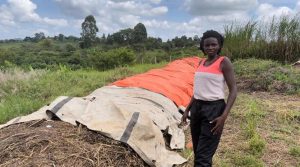If done right, composting can be an incredibly effective way of adding nutrients and life to (agricultural) soils, without the harmful effects that chemical fertilisers have. Where chemical fertilizers only give a short-term boost to crops while diminishing the overall soil quality, compost enriches soil structure, promoting better water retention and aeration. This, in turn, fosters healthier root systems and enhances the overall resilience of plants to environmental stressors. Compost acts as a slow-release fertilizer, providing a balanced and diverse array of essential nutrients for plant growth.
Over the past years, Lake Albert Foundation has experimented with different types of compost at farms in Zombo district, Uganda. We've seen the benefits it can bring first-hand, so now we are ready to start large-scale compost production at the seed potato farm Kilimo Kisasa in northwest Uganda. We will produce 2 types of compost: SPICE (Static Pile Inoculated Compost Extension) and Johnston-Stu compost, to which we add our organic, home-made inoculants to improve compost quality. Both compost types are non-turning composts, in order to retain as many nutrients as possible. If you would like to learn more about the different ways to make compost, please don't hesitate to contact us!


